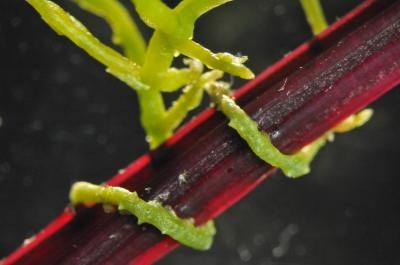Parasitic Plants May Be Talking To Their Hosts Through MRNA

If you still have nightmares about the Venus Fly Trap in "Little Shop of Horrors" saying, "Feed me, Seymour," you're not going to be happy about the findings by a Virginia Tech scientist. Jim Westwood, a professor of plant pathology, physiology and weed science, has found plants communicate with each other on a molecular level, but it's still unclear what they're saying to each other.
Westwood looked at the relationship between dodder, a parasitic plant, and two host plants, Arabidopsis and tomatoes. Dodder sucks nutrients out of its hosts with a haustorium, which penetrates the host, transferring thousands of mRNA -- or messenger RNA -- molecules between the plants.
Westwood said in a press release this exchange of mRNA might mean the parasitic plants are telling the host what do to, such as lower its defenses to allow the parasite to feed more easily. The next step is to determine what the plants are saying and whether the same relationship exists between bacteria and fungi.
"The beauty of this discovery is that this mRNA could be the Achilles heel for parasites," Westwood said. “This is all really exciting because there are so many potential implications surrounding this new information."
Julie Scholes, a professor at the University of Sheffield in Britain, who is familiar with Westwood's work but not part of this project, said parasitic species are a serious problem for vegetables and other crops. "In addition to shedding new light on host-parasite communication, Westwood's findings have exciting implications for the design of novel control strategies based on disrupting the mRNA information that the parasite uses to reprogram the host," she said.
© Copyright IBTimes 2024. All rights reserved.






















